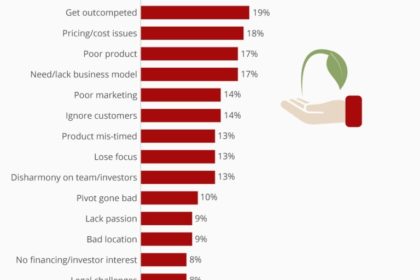
Here’s the hard truth, since you’re here, since you’re asking when to quit a startup, the answer is now.
Because you asked.
Truly. That’s the answer.
Most Startups fail and they actually fail not for all the reasons cited but rather merely because the founding team doesn’t have their heart in it any more. Your IDEAS will fail; your mission, if you’re truly set about it, can’t until you stop.
For example…
Startups all start without any money. Right?
Yet a frequently cited reasons that startups fail is that they ran out of money.
So, no… they ran out of money and the team decide to give up. There is no reason the team can’t go back to the drawing board and rethink how to make their mission work.
Your startup is NOT an idea and it isn’t a product. It’s a business. If your idea proves wrong in accomplishing what you set out to accomplish, or your product doesn’t work, what does that have anything to do with why you set out to accomplish something??
If you started a company just to build your idea, you started for the WRONG reasons. And so I’m speculating, since you asked this question, that the answer is that you should just get out now.
- You’re clearly doubting keeping at it. You’re considering quitting. Successful founders don’t do that.
- You’re referring to the idea, as though that has any merit.
- And you’re referring to quitting and starting another so you can try another idea…
I consider exploring that a definition of insanity, but hey, you be you. Why would start another company just to try an other idea?? Why would throw away all the work you’ve done??
 In my work, our work, we have new ideas constantly. Daily. The business isn’t the Idea. We try things, they don’t work, we try something else.
In my work, our work, we have new ideas constantly. Daily. The business isn’t the Idea. We try things, they don’t work, we try something else.
We set out to build a company that enables more capable and effective deployment of capital into media innovation. We only fail if we quit.
You only fail because you’ve considered that you could.
And there is no way I’d quit… I’ve invested time, money, reputation, and more in building our business. An idea therein not working is just another day!
Follow? “Startups” are distinct from “new businesses’” because they’re built upon the tenacity to solve a new problem and create value. HOW you do that is a matter of what works… most of what you try, won’t.
A new business isn’t a startup. If I’m opening a new bank, for example, that model is well-known. We don’t have to test and try to figure it out. It’s known how to open a bank.
So quitting on a bank, frankly, is a little deserving of an eye roll … how’d you not get that right??
But quitting on a startup is giving up
… no one knows what’s right: it’s a startup!
What did you set out to accomplish? What was your mission? Why are you quitting that??? Because the one idea that you have isn’t valid to accomplishing that?? My friend, you shouldn’t have started in the first place if you weren’t prepared to put new ideas to work almost constantly. The job of being a founder isn’t making an idea work; it’s executing many ideas as quickly and efficiently as possible so as to accomplish the mission you set out to accomplish.



Really enjoyed this. It makes me wonder how often the original mission shifts (for legitimate reasons or otherwise) because founders think they’ve run out of ideas.
Far more often than you might think. Worse, how often good ideas are abandoned because people focus on demand for the solution rather than the reason there is an opportunity.
Shaun Patrick most times it’s not running of ideas but actually difficulty is executing the one idea the founders set out to accomplish. That’s why fundraising is far more easier for seasoned/successful/serial entrepreneurs as it imbibes confidence in investors that they can convert the the idea to a product.
Yeah, i disagree. In the early days of PubLoft, I thoughts about quitting all the time.
“Is putting another rent on my credit card worth it”?
“Maybe I should just listen to family and get a job”
“Customers are churning, do people really need this?”
“Am I really the one who can bring this to life? Why me?”
For a period of time, every day I thought about quitting. Every damn day. But I didn’t. And now we’re flying. A founder isn’t judged for what they think. They are judged for what they do… and when all they want to do is quit but they persevere, that’s when great founders are made.
Mat, another great point. There’s knowing when, and then there’s a difference. It’s a fine line around insanity, but still worth it in the end.
“You have to be persistent. You have to keep going when everyone tells you to quit. But first you have to be right.”
(Bob Metcalfe at the first Startup Weekend in Austin – to the best of my remembering the wording.)
Yup, I agree with Mat Sherman. We started off with a bad product and were running out of money, had terrible marketing, etc etc… asked myself if I should quit plenty of times… and we still pivoted. Made it through – launched 2 successful Kickstarter campaigns, funded our production for a new product and saved the brand. You keep going. Of course you’ll ask yourself questions, we’re fucking human not robots – what matters is that you pull through.
This post has way too much good stuff in it. I totally agree with Paul when he says “you are referring to the idea as if it has any merit.” His point about “you have a business not an idea” is a good one — because there is a difference between an inventor (creating a solution) and an entrepreneur (creating a business) and a lot of people seem to have those collapsed. But in early stages (meaning before you have an offer that is converting very highly with some population), I would say you sound like you “have something” that you are now giving up on. But consider that you don’t “have something” at all. It isn’t anything until you have evidence that it is. What saves a lot of time is looking much harder — with a rigor — at the reality of whether you have something or not … particularly before you get too caught up in the rest of it.
This, of course, is assuming that you are doing a “venture way” business, where you see an opportunity to solve a specific problem and are going after it. If you are doing a “visionary way” type of startup, it is like what Paul was saying. It is based on a vision. You build a business to do something great in the world — like transform how human beings connect with each other through media — and you keep at it, trying strategy after strategy until you figure it out. Because this is what entrepreneurs do — they create the future. THAT is a lot harder to give up on than the first one.
Love this: “The job of being a founder isn’t making an idea work; it’s executing many ideas as quickly and efficiently as possible so as to accomplish the mission you set out to accomplish.” Paul O’Brien have you read Seth Godin’s book “The Dip”? Great book, with a different perspective.
OOooo! I need to Simone Stewart, I’ve not read it but I’m a fan and frequent proponent of Seth Godin’s work!
a few of these can be grouped into poor ‘product/market fit’
Yes, but parse that further. Poor product/market fit is because of…?
I hear ya
Two points stick out like a “sore thumb!” NO MARKET NEED? and POOR PRODUCT! What were these people thinking? Maybe they were “vanity entrepreneurs?”
I mean, “no market need?” Why did they bother?
Right? And yet they do.
Why? Because WORSE, I think, crappy mentors and advisors guide people to believe something else matters more, or that founders can overcome these priorities in time.
“When I’m tired”
Love this. Startup Weekend has it right when they focus so much on “get out of the building,” and talk to potential customers.